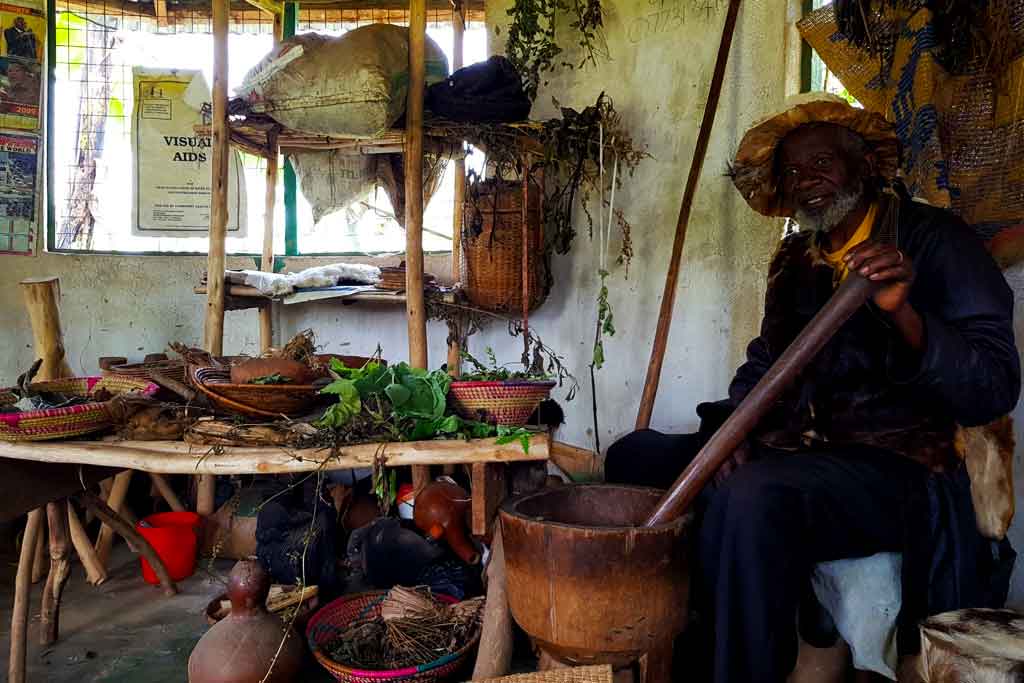Local traditional healers in Bwindi serve the communities that live on the fringes of Uganda’s Bwindi Impenetrable National Park, the home to half of the world’s remaining mountain gorillas. Some local traditional healers are natives of the community while others have fled unrest from the nearby DR Congo. Their families have now set up residence on the edge of Bwindi forest.
On the small plot of land, the local traditional healer grows a wide range of medicinal herbs and plants. These they harvest for use in their daily practice, while others are picked from the forest. Those which are grown were originally derived from Bwindi forest, which contains more than 400 species of flora.
Armed with a large wooden pestle and mortar and some water, they grind up the leaves, shoots, and roots of these plants, transforming them into different healing potions. Next, they use a sieve made of dried reeds to separate out the plant matter, leaving just the liquid behind.
The potion is then decanted into a dried and hollowed-out pumpkin husk that serves as a drinking vessel. Lines etched into the side of the cup are used as a guide for measuring out dosages according to the patient and nature of their condition.

Administering treatment to patients by local traditional healers.
Upon presenting with an ailment, patients undergo a brief consultation before being administered an appropriate treatment. In most cases, the portion is either drunk or rubbed onto the affected parts of the body.
Some of the more serious ailments local traditional healers have been known to treat include malaria, tuberculosis, and dysentery. However, the know-how also extends to a range of other social and health-related conditions such as women’s health, impotence, social problems, and evil spirits.
For many of the marginalized people that live around Bwindi, traditional healers like Alfonsé are their first and last line of defense. This is for a number of contagious and debilitating diseases.
Pros and cons of local traditional healers in Bwindi.
There are several reasons why local traditional healers are so popular. Firstly, they often outnumber other health workers in rural areas, being more accessible and more affordable than their western-trained counterparts.
Secondly, and perhaps more importantly, it is because they are embedded, extensively and firmly, within the Ugandan culture. They are highly respected and widely consulted members of the communities.
Despite their prominence in Ugandan society, there are several fundamental concerns with traditional healers. Firstly, many of them have had little or no contact with modern medical doctors.
Secondly, the majority of their treatments lack a credible evidence base, often being prescribed without any scientific proof that they are safe or effective. Some are actually known to interfere with the effectiveness of modern treatments, such as anti-HIV drugs.
Thirdly, traditional healers are known to spread myths and misconceptions on important health and social issues. These are known to spread malpractice in the communities.
Acceptance of healers in Bwindi.
The good news is that African governments are increasingly beginning to recognize traditional healers as an integral part of their health systems. They have realized that by excluding them, they can actually cause more harm than good.
Governments also acknowledge that, through education programs, traditional healers’ unique first-point-of-contact position can be leveraged to improve access to modern healthcare services. By training them on how to implement a science-based program of counseling and basic healthcare, they can be used to refer patients with serious conditions to hospitals for proper treatment.
Local traditional healers should not be left on the sidelines of conversing with the community. In fact, they play a key role in conservation through public health, and integrated conservation community health programs. These ultimately aim to allow gorillas, humans, and their livestock to co-exist through improving primary healthcare.
Without losing the traditional essence of their practice, they now attend monthly village health and conservation teams’ meetings. Through these meetings local traditional healers have been trained on when to refer suspected TB, HIV, and malaria patients to the community hospital. They are also advised to encourage modern family planning practices to the community.
Ultimately, thanks to the combined efforts of both sides, the local traditional healers and the social health sector. A greater number of people are receiving proper healthcare in the protected areas around Bwindi Impenetrable National Park.
